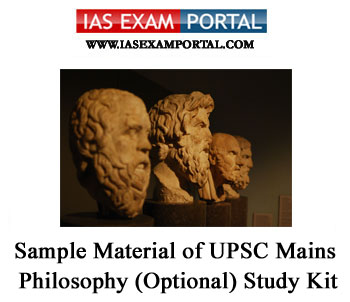(Sample Material) UPSC Mains Philosophy (Optional) Study Kit "Socio Political Philosophy (Rights)"

Sample Material of UPSC Mains Philosophy (Optional) Study Kit
Topic: Socio Political Philosophy (Rights)
Rights are defined as external conditions for development of personality of the individuals. Every individual has certain inherent potentialities for the realisation of these potentialities certain favourable conditions are needed therefore individual makes certain claims from the state if these demands are not against the society and individual himself and they are recognized by the state, then they become rights. Therefore rights can be defined as a collection of external conditions which are essential for the development of the personality of the individual which are not anti-social and which are recognized by the state.
Various theories of Rights.
1) theory of natural Rights. (Earltest theory)—Locke Thomas Paine, Herbert Spencer. Historical background against absolute monarchs.
Theory of natural right believes that right are given by nature or god. Therefore individual is born with rights since state or society does not create rights therefore they cannot violate or take away the rights of individuals. Therefore rights are in alienable. If state curtails or takes away the rights of the Individual, be may revolt against the state. Theory of natural rights supports the notion of the limited state.
According to Locke, there are three natural Rights, right to life liberty and property.
Click Here for UPSC Mains Philosophy Study Material
Criticisms
i) This theory goes to the extreme as far as rights of the individual is
concerned.
ii) This theory believes that rights are absolute. This may create many
problems. One the one hand it may create anarchy. Second it may led to vast
socio-economic disparities
iii) Which rights are natural rights it is very difficult to decide.
iv) The nature or god as a source of rights cannot be justified a Source of
right scientifically and logically. Therefore green describes this theory as
ridiculous. Bertham also criticized it as meaningless jargon.
Significance
i) This was the first systematic theory of rights.
ii) This theory may act as a safeguard again dictatorship. In practice also
great revolution like French and American Revolutions were inspired from the
theory of natural rights.
iii) Contemporary notion of human rights
Legal Theory of Rights Bentham, Austin, Hobbes
According to legal theory of Rights, rights are not natural but they are the creations of the state. State plays central role regarding- rights. Only those claims of the individual which are recognized by the state as rights are valid rights. In the roods of Bentham, rights are the result of law, there is no right without law and there is no right outside law. Explaining his view Bentham maintains that state pays central role regarding rights like.
1) State defines rights.
2) State puts logical limitations on rights.
3) State provides the administrative and institutional structure to implortant
rights.
4) State amends rights according to changing circumstances.
According to legal theory of rights are not absolute, logical restrictions may be imposed on rights.
Criticisms
1) Philosophically the concept of rights is an individual centric concept but
legal theory makes it a state centric notion.
2) State is not supreme regarding rights. It cannot make certain evils like
bribery or murder as right.
3) Rights are not rights because state recognizes them as such but state
recognizes them because they are essential for individual.
Significance
i) This was the first theory which-provided a systematic form to the notion
of rights.
ii) Every right has two dimensions, moral and legal aspect of rights.
iii) In practice also, in none of the countries, rights against. Law is
accepted.
Philosophically it is not a very sound theory but practically it is most important.
Historical Theory of Rights
A Burke formulated this theory. According to historical theory, rights are neither the gift of nature nor the creation of state but they Emerge in the course of historical development of Society. According to Burker the Rights are the crystallization of customs. This means that social custom and traditions in due course of time become so important, that ultimately they are recognized as rights but only recognizes them. They also believes that the notion of rights differ from state to state and from one age to other age because of the different level of historical development of the society. Burke criticized French revolution because it was based on the theory of natural rights and he supported glorious revolution of Britain because it was based on customs and traditions of British people.
Criticisms
i) All rights are not based on customs and traditions but certain rights
develop against customs and tradition rights of women, slaves etc.
ii) All rights are not for the welfare of society. Eg. Slavery, sati, polygamy.
iii) Historical theory reduces the possibility of social reform and in this way
violates the dynamic nature of rights.
Significance
i) There are some rights in every society which are based on customs so this theory is true to that extent cohere it accepts custom as one of the important sources of rights.

